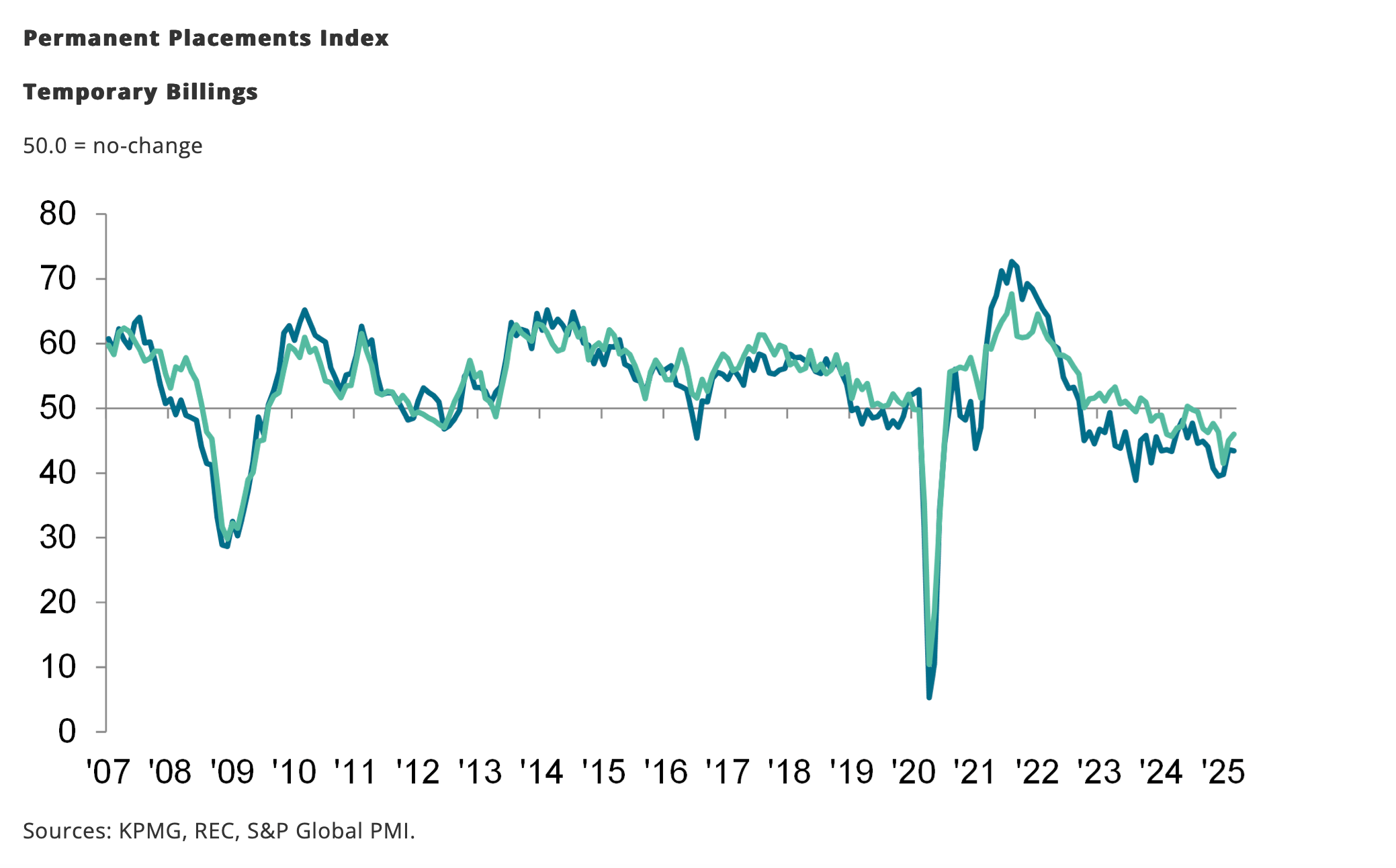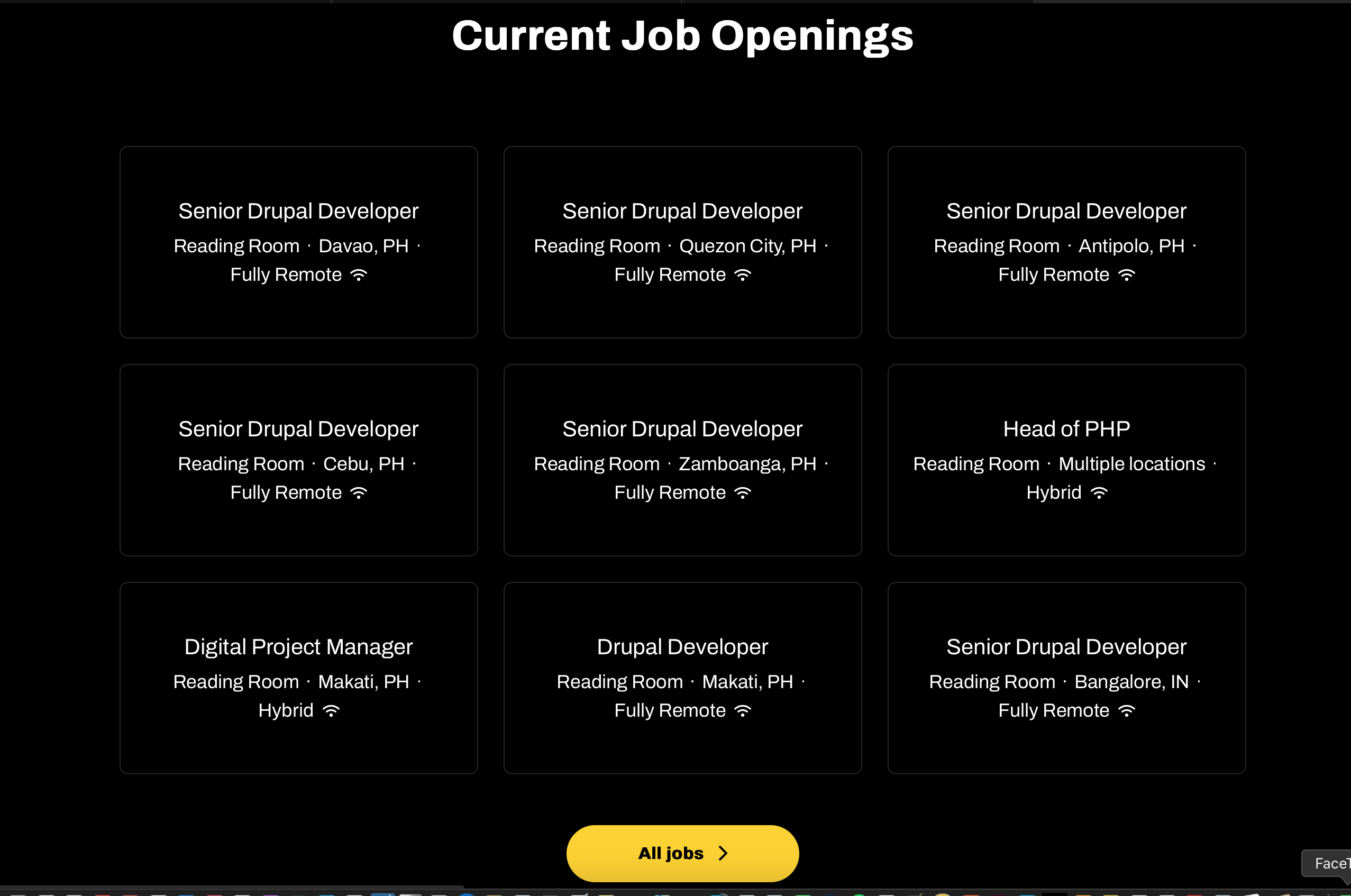Drupal jobs in the UK in 2025

2022 was turning into a good year for work. I had just secured a working from home opportunity for a well known UK based insurance company. Turns out they had just recently offered the majority of their in house development team early retirement. The ones that were left to pick up the pieces had too much work to handle updating Drupal to the latest version and this was the primary reason I was being brought in.
After starting work for 3 weeks after applying for necessary software and permissions from my locked down machine, I was still waiting for their IT department to set up access on my VM to all the tools that were required to work and my contract was extended by a few weeks to account for this additional time. Once access was set up I was able to deliver the updates and was also able to address a couple of longstanding issues that seemed to be creating more work for the remaining web team at the same time.
When releasing the changes there was an issue with one of the changes and it was suggested that my contract could be extended again so we could make arrangements for a second release. However I was able to quickly identify and remedy the issue so this was no longer required. I then spent the remainder of my contract looking for things to do and was asked to look at a couple of issues including how to improve the test coverage of the site. As I had delivered the changes and there were no issues or regressions I was hopeful that this might lead to further work. However when I dared to ask the head of department about any future opportunities he quickly poured cold water on the idea saying that would not be happening.
Before I finished my contract the Head of Department invited me to attend a wider Teams meeting and give a chat about what I had been working on. From what I could tell most people on the call were working remotely across different countries and this was my first contact with them. Almost like a hello and goodbye. At the end of my chat there were other many questions but the Head of Department asked me to give any tips or recommendations. Again I found this peculiar but nonetheless managed to improvise and used the opportunity to extoll some of the benefits of open source software.I did n't dwell on this but on reflection it did seem like an odd decision to retire the majority of the experienced UK development team only for them to be replaced by an inexperienced offshore developers, many for whom English was not their native tongue.
Eventually when I finished up, I was quietly confident of finding another vacancy. In fact the head hunter who has placed me and was also in the process of buying a house was quite keen to try and secure another opportunity for me. These turned out to be permanent as opposed to contract opportunities but I was able to secure an interview and find out more about the potential opening. Nothing came of these but seeming as I had secured 3 separate contracts that year I was quietly optimistic that it was just a matter of time before another contract was forthcoming. In the meantime I had a couple of my own Drupal projects to work on and a list of things that I wanted to develop further.
Nearly 3 years later I am still awaiting my next Drupal contract! Now, 3 years is a lot of water under the bridge. In that time I have managed to contribute several contributed modules to Drupal.org and have also managed to secure the necessary security privileges to release my own modules. In the UK the economy has been stuck in neutral with the combined challenges caused by Brexit, Covid 19, the Russian invasion and annexation of parts of Ukraine and the ensuing cost of living crisis largely caused by the spike in energy prices and in particularly gas, of which Russia has the worlds biggest reserves.
In 2002, every week I would have at least one call from a headhunter or recruitment consultant wanting to represent me for a new opportunity. Many of these were not really a good match for my skillset and experience and I would politely refuse. Contracting can be a bit like fishing. You wait ages for an opportunity and then 3 come along at once. In my experience some patience is required until there is a good match. The world of website and development is quite specialist. e.g. There is little point in applying for a C# .net developer role when my experience has been predominately been centred around open source in a LAMP stack.
3 years later, months can go by without being contacted by a recruitment consultant or headhunter. In fact, there appears to have been a reduction by a third. According to Sid Barnes "Recruiters have lost the ability to sell as well as the ability to hunt", told an audience at the Recruitment Industry Expo last month. "This has contributed to the loss of about a third of the UK’s consultant population in the last two years, he contended.".
A third less headhunters in the UK in 2 years seems massive to me. If we look at the recruitment figures across the whole UK market we can see that permanent positions in the UK have been in decline since 2022 and temporary positions in decline since 2023.
Image

This is a very high level overview, but if you drill into IT and Software Development sector then the findings are even more pronounced. Some outlets try to remain upbeat and even celebrate the fact that the jobs market is declining less sharply or bottoming out. However the fact remains the IT and Software jobs market has been in decline in the UK for 2-3 years now.
Fewer Headhunters
The reduction in Head hunters and recruitment consultants looks set to continue in 2025. Earlier this year Hays, the biggest UK recruiter says "profits more than halved in the latter part of last year, amid hiring slowdowns across firms in the UK and Europe." This has culminated in them laying off over 1000 staff and closing 15 of their UK and Irish offices.
My experiences
In 2023 I secured an interview with another UK based agency called Hogarth Worldwide. Hogarth are one of the biggest Drupal houses in the UK and work closely with multi-national companies like Unilever that have offices all over the world. In seemed that the role was quite hands off and involve mainly managing the development team and liaising with various stakeholders. They probably have over 100 developers working for them at any one time. I asked how many were based in the UK. "zero".
In 2024, I saw a post on Drupal.org's Slack Group for a Drupal developer position for UK based Drupal house Zoocha. Much like Hogarth, Zoocha are a Drupal house that work with many UK corporations and organisations across different industries. They are a government approved supplier and also work with the likes of Royal Borough of Kensington and Chelsea, the NHS and other house hold names. However to apply for the vacancy you needed to be based in Brazil. This seems to be true for their development roles posted on their website in 2025.
In 2025, (this year) I was looking to apply to another Drupal House this year for the position of Head of PHP. After failing to register my interest on the career portal (probably a technical reason) I looked on their own website and applied there. To my astonishment they were also had multiple Senior Drupal Developer remote opportunities available across the world but restricted to the Philippines. To put this into context that's more than I have seen advertised in the UK all year.
Image

They have have many high profile UK based clients including the Royal Family. After seeing this I felt obliged to contact their Chief Executive for an insight into why UK based developers were unable to apply for any of these vacancies:
We are predominantly [sic] UK today (nearly all our 30+ developers are UK, including .NET etc) but are having to look to lower cost locations to attract / retain clients. We’re doing that as we grow rather than exiting UK developers.
AI
The rise of AI makes it easier for someone with little or no experience to pick up a job quickly. A friend of mine was able to quickly generate an image that would have taken an experience designer maybe a few days to create . Similarly with software development, AI can be used to quickly write code, even by someone with little or no experience of actually writing code. With the introduction of AI over the last few years, it is possible that AI can be used to soften any transition from an experienced development team. In fact I also managed to secure an interview with UCL and they actually encouraged the use of AI as part of their coding test. At the time I wondered what they were actually testing, but for them the use of AI was acceptable and even encouraged.
Conversely, AI could also help you retrain and pick up skills in new areas.
Reflections
After working as a Web Developer for over 20 years and 15 years specifically with Drupal, I find it odd that I am struggling to find any work in the UK in 2025. My friends also find it odd. After the end of COVID 19 and lockdown the jobs market in 2022 seemed to recover quite strongly, even to the point of overheating. This culminated in double digit inflation and high interest rates. The war in Ukraine exacerbated the cost of living crisis and many organisations looked to cut costs to help counter the crisis. This has resulted in both companies and agencies gearing up their off shore teams as a way to cut costs and remain competitive. Many have been able to do this while boosting wages for their existing workforce which have seen rises at above inflation. However, the change of approach that is endemic across the UK comes at a cost.The new governments positioning to raise the overheads of employing UK based staff has culminated in further pressure to look at ways of off shoring staff. With the increased acceptance, and in some cases increased demand for WFH since the pandemic the barriers to remote working have reduced and it is easier and cheaper to employ someone from out side of the UK. This has culminated in organisations across the UK, both public and private driving the demand for offshore software development that can often been done with out many of the overheads of employing someone in the UK, and can likely be done at a fraction of the cost.
Drupal is largely used in government institutions and corporations. For scalable and secure infrastructure it has an edge over Wordpress that while easier to set up for smaller sites, is less scalable and flexible content management system for more complex sites. Historically many organisation's have employed an in house team or used a specialist agency to help design, develop, maintain and update their site. Coinciding with the cost of living crisis in 2022/23 many of these organisations have seen more acceptance of the working from home culture. This has created an opportunity for organisations to reduce their costs and boost their profits by actively recruiting off-shore. In some circumstances this has culminated in entire teams of UK based developers being laid off. In more measured approaches, UK workers are retained, but organisations are looking to recruit from abroad to remain competitive.
The demand for off-shore resources looks like a trend set to continue in 2025 as the economy seeks to return to growth. This also means that there are likely less opportunities available for UK based developers compared to how it was before the pandemic and the cost of living crisis. While at least in the short term, this strategy may be beneficial to UK employers and clients, it is also likely to result in many highly skilled and experienced developers in the UK facing long term unemployment. The other side of the coin is a reduction in opportunities that they may well be well qualified to apply for and a burgeoning social welfare bill with reduced tax revenues.
For UK based developers finding a job might just be getting that little bit more difficult as they are now competing with the rest of the world. This is even more so with certain specialist areas such as Drupal, where the potential savings for companies can be even greater.
Add new comment